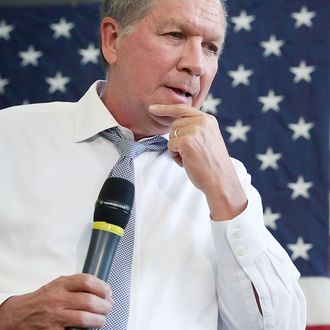
On Thursday morning, MSNBC’s Joe Scarborough asked Ohio governor John Kasich to explain how his party ended up nominating an authoritarian demagogue that he can’t bring himself to endorse.
“The media gave him $2 billion worth of free press,” Kasich replied. “I mean, look, you guys have a lot of responsibility for this. You know it, too. You all know it, you know?”
Deli-meat-loving fiscal conservatives aren’t the only ones still voicing this complaint. A report on media coverage of the primary campaign released by Harvard’s Shorenstein Center this week concludes, “Trump is arguably the first bona fide media-created presidential nominee … Journalists fueled his launch.” The study finds that Trump received $55 million worth of publicity last year from eight major media outlets alone. A mid-March report from the data analytics firm mediaQuant put the value of all of Trump’s free media attention at $2 billion. These figures — combined with the surging ratings enjoyed by cable news channels (and surging traffic by political-news sites) — have inspired no small number of media mea culpas.
The psychological impetus behind these is understandable: Few stories have highlighted the divergent interests of the news industry and the American people more than Donald Trump’s campaign. But just because news outlets have benefited from Trump’s nomination doesn’t mean that they caused it. And the resilience of the “media created Trump” meme is baffling, in light of the current state of the 2016 race.
All publicity is not good publicity. If it were, public-relations crisis-management firms wouldn’t exist — and Trump’s poll numbers wouldn’t be in free fall after the saturation coverage of the past two weeks. Recent polls show 70 percent of the American public now holds an unfavorable view of the Republican nominee, as he falls further behind Hillary Clinton in general-election trial heats. This dip was not the product of cable networks suddenly turning their cameras away from Trump. Rather, the media’s steadfast attention to the mogul’s various obscenities did what it has been doing for the past 12 months: increase the number of American voters that see Donald Trump as unfit for high office.
According to the Huffington Post’s aggregation of opinion polls, roughly 55 percent of the public viewed Trump unfavorably in August 2015. By early March, with media coverage intensifying amid the heat of primary voting, that number had grown to 61 percent. The more the broad electorate saw of Trump, the more they disliked him.
To be fair, the Shorenstein report does not claim that all publicity is good publicity. Rather, it contends that Trump enjoyed more “positive or neutral” news coverage than his primary rivals and that early reporting on his campaign was disproportionate to voters’ interest. But as The Atlantic’s Molly Ball notes, the study appears to mix up cause and effect:
But when you look at the report’s evidence, the preponderance of this coverage turns out to be reporting on the fact that Trump was gaining in the polls and attracting large crowds to his events. The press is the effect here, not the cause: The media were noting—often to their collective surprise—that more and more Republican primary voters were becoming receptive to Trump’s message.
Positive coverage of Trump’s candidacy did not consist of mainstream journalists lauding his claim that Mexican immigrants are mostly rapists. Rather, it consisted of acknowledging that such claims were resonating with Republican voters. And even then, the media was famously hesitant to take Trump’s polling strength seriously. When the real-estate heir came second in Iowa, many outlets called it a deathblow to his candidacy, while championing Marco Rubio’s third-place finish as a triumph.
The media lavished Trump with attention because the American people enjoy watching garbage fires burn. But only the GOP base wants to make a garbage fire our president. Thus, responsibility for Trump’s political fortunes rests with Republican voters — and the party that conditioned them to mistake flaming refuse for fearless leadership.






























